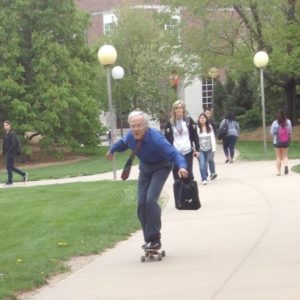Theory versus Practice. You may have seen someone who was “Born to teach” like this year’s National Teacher of the Year, Jahana Hayes or the one seen in this picture, who just seems like the kind of teacher who can entertain and inspire you. But most teachers rely on their training to become the great educator s our country needs to prepare the next generation.
s our country needs to prepare the next generation.
The problem is, too many educational courses are based in theory and not actual practice.
Coming out of college with over two thirds of the coursework based on educational theories is flat out ridiculous. “Best Practice” is CONSTANTLY changing and varies from state to state and even from district to neighboring district!
Teachers may find themselves teaching in a school whose core educational practice was one that their professor thought was less important than another practice when trying to squeeze everything into their limited time with you. Oops, there goes a whole year of study. Preparing a teacher for the classroom needs a foundation in theory and much, much more time to practice it.
I was recently inspired by an article in The Economist here, which describes several aspects of teaching that must be taught to produce educators of the highest caliber. From what other countries are doing well to proposed professional developments and techniques, it addresses many issues in our educational system.
For example, you might think that constant praise for your students’ work is the right way to go, but undeserved praise is actually detrimental to establishing high expectations. Read about this in a thousand articles and books and you still won’t know how to walk the fine line between giving out too much unearned praise and too little motivational words.
 The only way to truly understand this is to PRACTICE it… and you must practice it under the kind scrutiny of an experienced educator. You must see what works and how it can work for it to be effective.
The only way to truly understand this is to PRACTICE it… and you must practice it under the kind scrutiny of an experienced educator. You must see what works and how it can work for it to be effective.
Some may know how to quiet a group of energetic students instinctively, but to see many different types of methods in action is beneficial to even the most attuned teacher. Studying versus actually seeing the practice implemented in a real-world environment is light years away from each other in value.
Imagine this. A student studying to be a teacher finds him/herself in a class and is given homework to read about several theories and practices to engage students in the classroom. Brain studies and learning styles aside, the focus is to come back to class with ways to implement this in the classroom. When everyone comes back to the classroom, the professor has set up small group simulations to ACTUALLY PRACTICE THE THEORY with the rest of the class! Then, he/she will show how to implement it with the class as a whole! Additionally, if student-teaching is happening at this time, the next assignment would include putting what they practiced into the actual classroom in small increments.
How much more effective do you think this would this be In lieu of an exam and a grade at the top of the paper? Would you keep it and grab it out of your desk to read about the theories when you are suddenly faced with a new type of class disruption?
The added benefit of this type of classroom theory to practice is that the aspiring teacher will actually choose to remember it, because it will be useful to him/her! Cramming for an exam will guarantee forgetting the material until it is too late to adopt it as a real tool for later use.
How will aspiring teachers know what works for  them, unless they use it and try it out at the same time they learn the reasoning behind the theory and practice?!
them, unless they use it and try it out at the same time they learn the reasoning behind the theory and practice?!
Bradley M Allan and Roland Fryer of Harvard University wrote about the Powers and Pitfalls of Education Incentives. The theory and results are there. Who will put them into practice and how it will be accomplished is the key question. Without the Practice, the Theory is bound to be forgotten or added as a footnote to support yet another “best practice.”
The simple truth is, “Best Practice” is what works best for that specific teacher in his/her specific classroom. But without the Practice, a teacher’s “best” is many years and many mistakes away before becoming the teacher we need them to be right out of the graduation gate.
